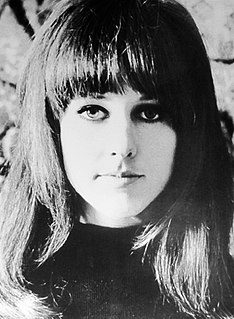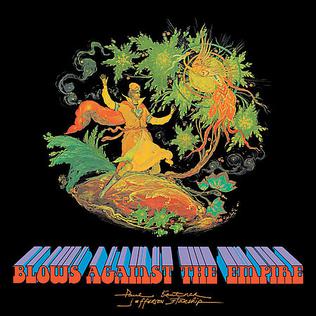
Jefferson Airplane was an American rock band based in San Francisco, California, that became one of the pioneering bands of psychedelic rock. Formed in 1965, the group defined the San Francisco Sound and was the first from the Bay Area to achieve international commercial success. They were headliners at the Monterey Pop Festival (1967), Woodstock (1969), Altamont Free Concert (1969), and the first Isle of Wight Festival (1968) in England. Their 1967 break-out album Surrealistic Pillow was one of the most significant recordings of the Summer of Love. Two songs from that album, "Somebody to Love" and "White Rabbit", are among Rolling Stone's "500 Greatest Songs of All Time".

Jefferson Starship is an American rock band from San Francisco, California, formed in 1974 by a group of musicians including former members of Jefferson Airplane. Between 1974 and 1984, they released eight gold or platinum selling studio albums, and one gold selling compilation. The album Red Octopus went double-platinum, reaching No. 1 on the Billboard 200 chart in 1975. The band went through several major changes in personnel and genres through the years while retaining the Jefferson Starship name. The band name was retired in 1984, but it was picked up again in 1992 by a revival of the group led by Paul Kantner, which has continued since his death in 2016.

Surrealistic Pillow is the second album by the American rock band Jefferson Airplane, released by RCA Victor on February 1, 1967. It is the first album by the band with vocalist Grace Slick and drummer Spencer Dryden. The album peaked at number three on the Billboard album chart and has been certified Platinum by the RIAA. The album is considered to be one of the quintessential works of the early psychedelic rock and 1960s counterculture eras.

Grace Slick is an American artist, painter and retired singer-songwriter. Slick was a key figure in San Francisco's early psychedelic music scene in the mid-1960s. With a music career spanning four decades, she first performed with The Great Society, but is best known for her work with Jefferson Airplane and the subsequent successor bands Jefferson Starship and Starship. Slick and Jefferson Airplane first achieved fame with their 1967 album Surrealistic Pillow, which included the top-ten Billboard hits "White Rabbit" and "Somebody to Love". She provided the lead vocals on both tracks. With Starship, she sang co-lead for two number one hits, "We Built This City" and "Nothing's Gonna Stop Us Now". She would also release four solo albums. Slick retired from music in 1990, but continues to be active in the visual arts field.
"Ozymandias" is a poem published in 1818 by Percy Bysshe Shelley.

John Michael Thomas is an American rock singer, best known as one of the lead vocalists of Jefferson Starship and Starship.

Martyn Jerel Buchwald, known as Marty Balin, was an American singer, songwriter, and musician best known as the founder/leader and one of the lead singers and songwriters of Jefferson Airplane and Jefferson Starship.

Paul Lorin Kantner was an American rock musician. He is best known as the co-founder, rhythm guitarist, and vocalist of Jefferson Airplane, a leading psychedelic rock band of the counterculture era. He continued these roles as a member of Jefferson Starship, Jefferson Airplane's successor band.

Starship is an American rock band from San Francisco, California. Initially a continuation of Jefferson Starship, it underwent a change in musical direction, the subsequent loss of personnel, and a lawsuit settlement that led to a name change. Starship's 1985 album, Knee Deep in the Hoopla, was certified platinum by the RIAA, and included two singles that went to number one on the US Billboard Hot 100 chart: "We Built This City" and "Sara". Their follow up album, No Protection, released in 1987, was certified gold and featured the band's third number one single, "Nothing's Gonna Stop Us Now". After a short hiatus in the early 1990s, the band reformed in 1992 as "Starship featuring Mickey Thomas" and resumed touring.

Craig Clinton Chaquico is an American guitarist, songwriter, and composer. From 1974 to 1990 he was lead guitarist for the rock bands Jefferson Starship and Starship. In 1993, he started a solo career as an acoustic jazz guitarist and composer.

Blows Against the Empire is a concept album by Paul Kantner, released under the name Paul Kantner and Jefferson Starship. It is the first album to use the "Starship" moniker, a name which Kantner and Grace Slick would later use for the band Jefferson Starship that emerged after Jack Casady and Jorma Kaukonen left Jefferson Airplane. From a commercial standpoint, it performed comparably to Jefferson Airplane albums of the era, peaking at No. 20 on the Billboard 200 and receiving a RIAA gold certification. It was one of the first two albums to be nominated for a Hugo Award in the category of Best Dramatic Presentation.

Marty Balin Greatest Hits is Marty Balin's 1999 album. The first half of the album contains all-new recordings of songs that Marty had previously performed with Jefferson Airplane, Jefferson Starship, KBC Band, and during his solo career. The second half of the album contains interviews with Balin about various subjects.
A goddess is a female deity.

Deep Space/Virgin Sky is a 1995 album by Jefferson Starship recorded live at the House of Blues in West Hollywood on the Sunset Strip. The concert was performed as a benefit memorial concert for Papa John Creach with proceeds going to his family. The original album rearranged the order of songs as performed and was divided into two parts with the first half featuring new material and the second half of the album featuring the classic hits of Jefferson Starship and Jefferson Airplane, including an appearance by Grace Slick performing vocals on "Law Man", "Wooden Ships", "Somebody to Love" and "White Rabbit". It was the first time she had performed on stage since 1989. In 2003, the entire concert was released as a double CD entitled "Deeper Space / Extra Virgin Sky" with the original order of the performance restored.

Jefferson's Tree of Liberty is the tenth album by Jefferson Starship, released on September 2, 2008. It is the band's first studio album since 1999's Windows of Heaven. The new album includes cover songs from Irish, American, English, and Latin-American traditions. The title is a reference to Thomas Jefferson's quotation, "The tree of liberty must be refreshed from time to time with the blood of patriots and tyrants." The idea began in 2003 as "The Cuba Project", which was to include classic protest and folk songs recorded in Cuba. In 2008 the album was finally recorded but in California. About half of the songs planned for The Cuba Project were used on the final cut, with other songs coming from Jefferson Starship's previous repertoire and another project band member Paul Kantner had planned called "On the Threshold of Fire." The promotional tour for the album began in late June with shows at Larkspur, California followed by tours in the US and Europe before the album's release, and continued through December 2008 with a further tour in the US and a tour in Japan. On February 1, 2009, more tour dates and venues were announced by the band's manager Michael Gaiman, with additional plans to continue the tour through 2010 and bring it to Australia and South America. David Grisman joined the band for the April 2009 tour dates. The band's promotion for the album ended in June 2009 as the band changed their set-list to Jefferson Airplane's Woodstock Festival material and started touring with the "Heroes of Woodstock" through the end of October.

David Freiberg is an American musician best known for contributing vocals, keyboards, electric bass, rhythm guitar, viola and percussion as a member of Quicksilver Messenger Service, Jefferson Airplane, and Jefferson Starship. Among other tracks, he co-wrote "Jane," a hit for Jefferson Starship.
Count On Me may refer to:

"Count on Me" is a 1978 song and single by Jefferson Starship written by Jesse Barish for the album Earth. The single, in lighter rock mode, gave Starship another US Top 10 hit after "Miracles". It was featured in the end credits to the movies Grown Ups and The Family Stone.

"Runaway" is a 1978 song and single by Jefferson Starship, written by Nicholas Q. Dewey for the album Earth. It was the second U.S. Top 40 hit from that album, and was the follow-up to the Top 10 hit "Count On Me". The song peaked at #12 on the U.S. Billboard Hot 100 and number 13 on the Cash Box Top 100.
Jesse Barish is a musician composer, most notable for composing the songs "Count On Me" for Jefferson Starship and "Hearts", "Atlanta Lady ", and "Do It for Love" for Marty Balin, former lead vocalist of Jefferson Starship.















